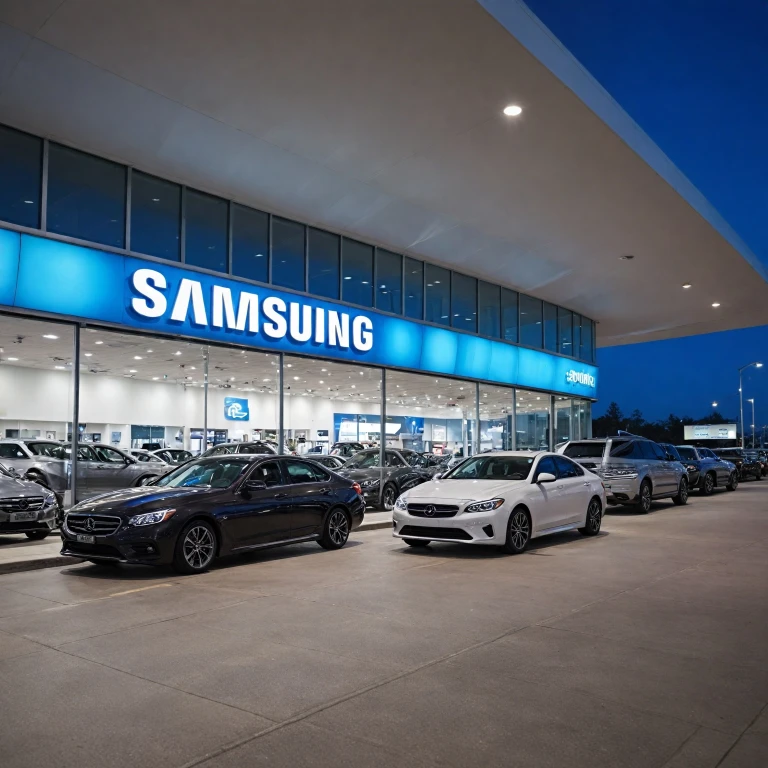
The Basics of Car Dealership Franchises
Diving into the Core of Dealership Franchises
In today’s competitive automotive market, the car dealership franchise model has become an essential cog in the business wheel. A car dealership franchise operates through a network of local dealers who primarily focus on selling cars manufactured by their partner auto brands. This system provides a franchisee the opportunity to harness the power of an established brand while maintaining some independence in business operations. Beyond just a focus on selling cars, such franchises often offer additional services like auto repair, car washes, and vehicle servicing to cater to a broad spectrum of consumer needs. These car dealerships typically function within well-structured franchise systems that help streamline operations and ensure a uniform standard of quality across various locations. For those considering investing in a dealership franchise, it’s essential to comprehend the integral components of this business model. From the very start, understanding the dynamics between the manufacturer and the dealer is crucial. The automotive manufacturer plays a significant role by setting guidelines, providing training, and supporting the dealer in their market endeavors. This relationship helps in maintaining brand integrity and ensuring customer satisfaction. For those aspiring to delve deeper into the car business, evaluating real estate options for the establishment of a dealership plays a major role. There's also the definitive impact of market trends and consumer preferences, which continuously influence the automotive landscape. For instance, innovative models like subscriptions and direct sales continue to evolve the way consumers access vehicles. For more insights on similar subscription-based models, explore the Volvo subscription service. Thus, car dealership franchises offer opportunities not just in vehicle sales, but also in creating long-term business success through a mix of innovation, comprehensive service offerings, and strategic partnerships with automotive groups. Comprehending these basics is essential for anyone aiming to navigate the complexities and capitalize on the opportunities in the car sales industry.Investment Opportunities and Risks
Exploring Franchise Investment Potential and Risks
In the competitive landscape of the auto industry, investing in a car dealership franchise can be a lucrative venture. However, potential investors must balance this enticing prospect with a clear understanding of inherent risks and the right opportunities. Like any investment model, automotive franchise opportunities require thorough research and strategic planning.
Here's what you need to consider:
- Potential for Profitability: The auto market, specifically in the United States, boasts solid opportunities for franchise owners. The demand for reliable automotive services and vehicle availability keeps the market buoyant. Dealership franchises have the potential to thrive due to consistent car sales and demand for customer service excellence.
- Franchise Fees and Costs: Starting a car franchise involves initial franchise fees, ongoing expenses, and real estate costs. Understanding these costs vis-à-vis potential revenue is crucial for a sound business decision.
- Risks of Market Fluctuations: The automotive market is subject to fluctuations. Factors such as changes in consumer preferences, advancements in automotive technology, and evolving manufacturer-dealer relationships can significantly impact profitability.
- Understanding the Franchise System: The specific franchise system imposes distinct obligations and operational guidelines upon dealers. This can affect everything from sales strategies to service offerings, necessitating a sound grasp of the business model.
- Commitment to Service Quality: Maintaining a competitive edge in the car business requires a steadfast commitment to service quality. This includes auto repair services, a seamless customer journey, and an efficient car wash operation, enhancing the vehicle purchase experience.
Balancing these elements successfully could mean the difference between a thriving dealership franchise and one that falls short of expectations. Whether it's a solo dealer or part of a larger auto group, understanding these factors is key to navigating the complexities of becoming a part of the dealership franchise world.
Legal and Regulatory Considerations
Legal Landscape for Dealership Franchises
When venturing into the world of car dealership franchises, understanding the legal and regulatory framework is crucial. This framework not only shapes how a dealership operates but also influences the broader business model. In the United States, the automotive industry is subject to a complex web of federal, state, and local laws that govern everything from sales practices to environmental standards.
One of the primary legal considerations is the franchise agreement itself. This document outlines the relationship between the car manufacturer and the dealer, detailing obligations, rights, and restrictions. It's essential for potential franchisees to thoroughly review this agreement to ensure it aligns with their business goals and capabilities. Legal advice is often necessary to navigate these agreements, which can be intricate and heavily favor the manufacturer.
Additionally, compliance with consumer protection laws is a critical aspect. Dealerships must adhere to regulations that protect consumers from unfair sales practices and ensure transparency in advertising and pricing. This includes following guidelines set by the Federal Trade Commission (FTC) and adhering to the Truth in Lending Act, which governs financing disclosures.
Regulatory Challenges and Compliance
Car dealerships must also consider environmental regulations, particularly those related to vehicle emissions and waste management. These regulations can impact the types of vehicles a dealership can sell and how they manage their service operations, such as auto repair and car wash facilities. Staying compliant not only avoids legal penalties but also enhances the dealership's reputation among environmentally conscious consumers.
Moreover, the rise of direct sales models, where manufacturers sell vehicles directly to consumers, poses a regulatory challenge. Some states have laws that protect traditional dealership models by restricting direct sales, while others are more lenient. This evolving landscape requires dealerships to stay informed and adaptable, as changes in these laws can significantly impact their operations and market strategies.
In conclusion, navigating the legal and regulatory considerations in the car dealership franchise sector is a multifaceted task. It requires a keen understanding of the laws that govern the industry and a proactive approach to compliance. By doing so, dealerships can mitigate risks and position themselves for success in the competitive automotive market.
Operational Challenges and Solutions
Operational Inefficiencies and Resolutions in Car Dealerships
Running a car dealership franchise comes with its own set of operational challenges, each demanding strategic solutions to ensure smooth operations and profitability. Here, we dive into some of these challenges and provide insights into effective resolution strategies.- Inventory Management
- Proper inventory management is crucial for any dealership. A surplus of vehicles can lead to increased holding costs, while too few cars may leave customers dissatisfied. Implementing an advanced inventory management system helps balance supply with demand, facilitating better decision-making in buying and selling vehicles.
- Staff Training and Retention
- Employees are at the heart of any automotive business. Investing in regular training and promotional opportunities not only uplifts the skill set of the team but also aids in retaining talent. It’s important to keep the sales team updated with the latest automotive trends and customer service techniques.
- Streamlining Sales Processes
- A seamless sales process not only enhances customer satisfaction but increases sales conversion rates. Digital platforms have revolutionized the car sales landscape. Utilizing CRM systems for customer interactions and leveraging online platforms for direct sales can simplify processes and improve customer relations.
- Dealing with Economic Downturns
- Economic fluctuations can impact the automotive market severely. It's essential for car dealerships to diversify their offerings, such as incorporating auto repair or car wash services, to stabilize cash flow during low sales periods.
- Compliance and Regulatory Adherence
- Navigating through legal and regulatory requirements is pivotal. By staying abreast of the latest laws affecting the auto dealership industry, dealers can ensure they're in compliance, avoiding hefty fines, and maintaining their business license.
- Leveraging Technology for Enhanced Operations
- Embracing technological advancements can streamline operational tasks. Integrating AI-driven tools for predicting sales trends and enhancing customer interaction through digital channels, positions a dealership at the forefront of the automotive market.
The Role of Branding and Marketing
The Impact of Brand Identity on Car Businesses
In today's competitive automotive market, branding and marketing play a crucial role in the success of car dealership franchises. A strong brand identity not only differentiates a dealership from its competitors but also builds trust and recognition among consumers. For car dealerships, this means leveraging the brand's reputation and association with quality and reliability.- Importance of Brand Cohesion: A franchise benefits from the consistency and cohesion of the brand established by manufacturers. Automotive groups that represent a singular brand across various locations ensure that consumers have a uniform experience, which is vital for retaining customer loyalty.
- Dealer Branding Strategies: Successful dealers often employ strategic marketing initiatives to enhance their local presence. This includes targeted campaigns, engaging service offerings, or unique selling propositions such as specialized car wash services or exclusive vehicle models.
Role of Marketing in Driving Sales and Consumer Engagement
The marketing efforts in dealership franchises extend beyond traditional advertisements. They encompass an array of consumer engagement tactics aimed at enhancing the customer experience and, ultimately, boosting sales.- Digital Marketing Utilization: The rise of digital platforms has transformed how dealerships interact with consumers. Utilizing social media, search engine optimization, and digital advertising can significantly increase a dealership's visibility and attract potential buyers to the showroom.
- Customer-Centric Campaigns: Tailoring marketing campaigns to meet the specific needs and preferences of the local market can enhance consumer engagement. Offering promotions on auto repair services or showcasing the latest vehicle models through virtual reality experiences are examples of how dealerships can captivate their audience.
Franchise Systems Leveraging Manufacturer Support
Manufacturers play a pivotal role in the marketing success of dealership franchises. By providing resources such as training, market research, and advertising support, manufacturers ensure that dealerships are well-equipped to represent their brand effectively.- Co-op Advertising Programs: Many manufacturers offer cooperative advertising initiatives that enable dealerships to share marketing costs, making comprehensive campaigns more feasible. This collaborative approach empowers auto dealerships to execute high-impact marketing strategies that might be otherwise financially challenging.
- Training and Development: Regular sales and customer service training sessions are often facilitated by manufacturers to align dealer operations with the overarching brand ethos. This helps create a seamless transition from manufacturer to dealer, fostering confidence among consumers.
Future Trends in Car Dealership Franchises
Innovation and Technology in Car Selling
The landscape of car dealerships is undergoing significant changes with the integration of technological advances. The automotive market is increasingly influenced by digital platforms, as more consumers turn to online channels for their vehicle purchasing needs. This transition is driving car businesses to innovate and adapt their franchise models to remain competitive.
In response, many dealership franchises are adopting modern technologies such as virtual showrooms and augmented reality experiences, enabling customers to explore car models from the comfort of their homes. This shift not only enhances customer engagement but also opens up new sales avenues for auto dealers. Furthermore, utilizing advanced analytics and AI-driven tools helps in better understanding consumer behaviors and preferences, leading to more tailored sales strategies.
Shift towards Sustainable Practices
The push for sustainability is another trend impacting car dealership franchises. As the automotive industry gradually shifts towards electric vehicles (EVs), dealerships are adapting their business models to accommodate this change. The demand for eco-friendly vehicles is shaping franchise opportunities, pressing dealerships to consider incorporating EVs into their inventory and service lineup.
This evolution requires investment in infrastructure, such as installing charging stations and training staff for EV maintenance. The dealerships embracing these changes are likely to stand out in the market, attracting environmentally-conscious consumers and establishing a competitive edge in the automotive landscape.
The Rise of Direct Sales Models
The traditional dealership franchise model is facing disruption from direct sales models, where manufacturers sell vehicles directly to consumers. This approach eliminates intermediaries, potentially offering cost savings to consumers and reshaping the auto dealer landscape.
Despite this challenge, many franchised dealerships maintain a competitive position due to their robust service offerings and established customer relationships. By enhancing in-dealership experiences and focusing on value-added services, such as bespoke financing and after-sales support, traditional dealerships can continue to thrive.
Ultimately, the future of car dealership franchises will hinge on the ability to innovate, embrace new market trends, and continuously adapt to the evolving consumer demands. As the industry evolves, dealerships that prioritize customer satisfaction and sustainability are well-positioned for success.





